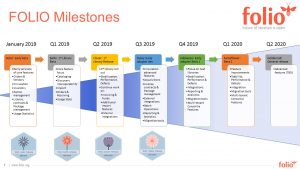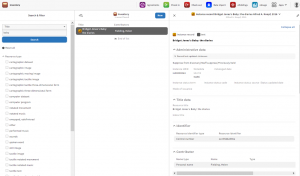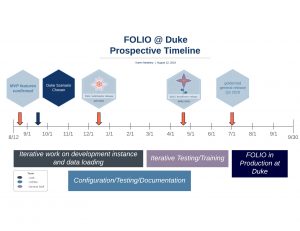Duke FOLIO Forum August 12 2019
What a great turnout! Thanks to all of you who came yesterday. Due to technical difficulties with the microphone in the room, we were unable to record the session. Rest assured, we’ll get that in place for future forums. We’ll also look at ways to live-stream, perhaps using Zoom meetings.
Deborah Jakubs started us off with a welcome and history of Duke’s involvement in this project. Did you know that Duke was approached by the Mellon Foundation to consider what an open-source system designed by librarians for libraries would look like way back in 2008? We partnered with Lehigh University the University of Chicago, and SOAS University of London. The resulting product was Kuali OLE (Open Library Environment) created in a partnership with the Kuali Foundation. Lehigh, UChicago, and SOAS are all using the OLE software today. The FOLIO project and community grew out of the OLE project.

Dracine Hodges continued with an overview of the FOLIO project. She described the primary partners, the OLE Foundation, EBSCO, and Index Data and listed the partner institutions. Our partner institutions span the globe, so we collaborate over Zoom, Confluence, Slack, and use Jira for tracking the user stories. She gave an overview of the major functional areas, cross-functional areas, and the FOLIO development process. Dracine shared the FOLIO milestones, with release names and dates and described the “cone of uncertainty” as we move farther into the future, which is normal in an agile project.
Lightning Talks were next on the agenda. We heard from Jacquie Samples and Jackie Gottlieb about the Metadata Management SIG, their sub-groups and working groups, and the areas where  they are focusing. These areas include Data Import, MARCcat, the Inventory app, Special Collections/Archives, Batch Edit, Data Export, Search Enhancements, Instance Metadata and MARC mapping, Analytics and Bound-withs, and Holding Metadata and MARC mapping, among others. They shared screenshots of an instance record, in this case, an item record for a book and how the administrative data such as the resource ID, ISSN, and other identifiers are shown.
they are focusing. These areas include Data Import, MARCcat, the Inventory app, Special Collections/Archives, Batch Edit, Data Export, Search Enhancements, Instance Metadata and MARC mapping, Analytics and Bound-withs, and Holding Metadata and MARC mapping, among others. They shared screenshots of an instance record, in this case, an item record for a book and how the administrative data such as the resource ID, ISSN, and other identifiers are shown.
Andrea Loigman and Erin Nettifee presented on Resource Access. They covered the functions included in Resource Access such as loans, returns, requesting, circulation rules, and fees and fines, to name a few. The RA SIG meets twice a week for an hour each, and Andrea as the convener of the RA SIG invites anyone who would like to participate to contact her. Erin ran a live demo using one of FOLIO’s test sites. She showed the process of placing a hold all the way through checking out the item with the hold to the patron who requested it.

Virginia Martin and Julie Brannon presented about the Resource Management SIG. Resource Management includes Acquisitions and E-Resource Management (ERM). Acquisitions functions include Organizations (Vendors), Finance (Budgets), Orders, and Invoices. ERM functions include Licences, Agreements, eHoldings and eUsage. We are not currently using an ERM here at Duke, so implementing an ERM would have to include reviewing MS Word documents where our licence data is stored, and manually inputting the data into the ERM instead of migrating data.
After the lightning talks, Karen Newbery and Laura Cappelletti shared information on Duke’s project plan, starting with a recognition that people learn in different ways and how we plan to address auditory learning (FOLIO Forums, updates at Open Forum and First Wednesday), visual learning (slides, demos, documentation), and kinesthetic learning (testing, training). Over 129 staff members have been identified for interviews across the Duke Libraries, including the professional school libraries. About 115 first interviews have been completed. Sometimes two or three interviews are required to gather all the information. Thanks to all who have taken their time to be interviewed. Each first interview takes about ninety minutes, so if you do the math…that’s a lot of time. We’re taking you’re opinions to the community as we work to build a better product, and as we consider the development of documentation and training. You’re part of the FOLIO community too!
The extended LSP Steering Group is producing a report that outlines five different scenarios that Duke could chose to implement FOLIO. They include implementing all of FOLIO for a small library, implementing all of FOLIO for all libraries or implementing a subset of functionality. The subsets we’re considering are: circulation focused, inventory plus MARCcat focused, or ERM focused. Each scenario is compared using assumptions, risks, impact to staff, and impact to patrons, to name a few criteria. The report will be compared to the list of functionality that will be included in the Market Viable Product (MVP) and presented to the Executive Group.

We reviewed the prospective timeline at Duke, punctuated with the FOLIO release dates. The boxes below the timeline show when and what will be happening here at Duke as we move toward implementation. Note that our date of moving FOLIO into production is still a date range. As we review the features that will be in the Market Viable Product and choose our implementation scenario, we’ll be able to be more precise in choosing our implementation date.
We now have a sample of FOLIO running on a Duke server. Details can be found on the Duke Libraries Wiki (login required). The sample server is not secure, so please do not put private data in it as you create users and other data. Work will continue on building a production-level, stable, and secure server.
Next Duke FOLIO Forum: Wednesday, November 20; 9:30 – 11:30 a.m.; Holsti-Anderson Family Assembly Room (RL 153)